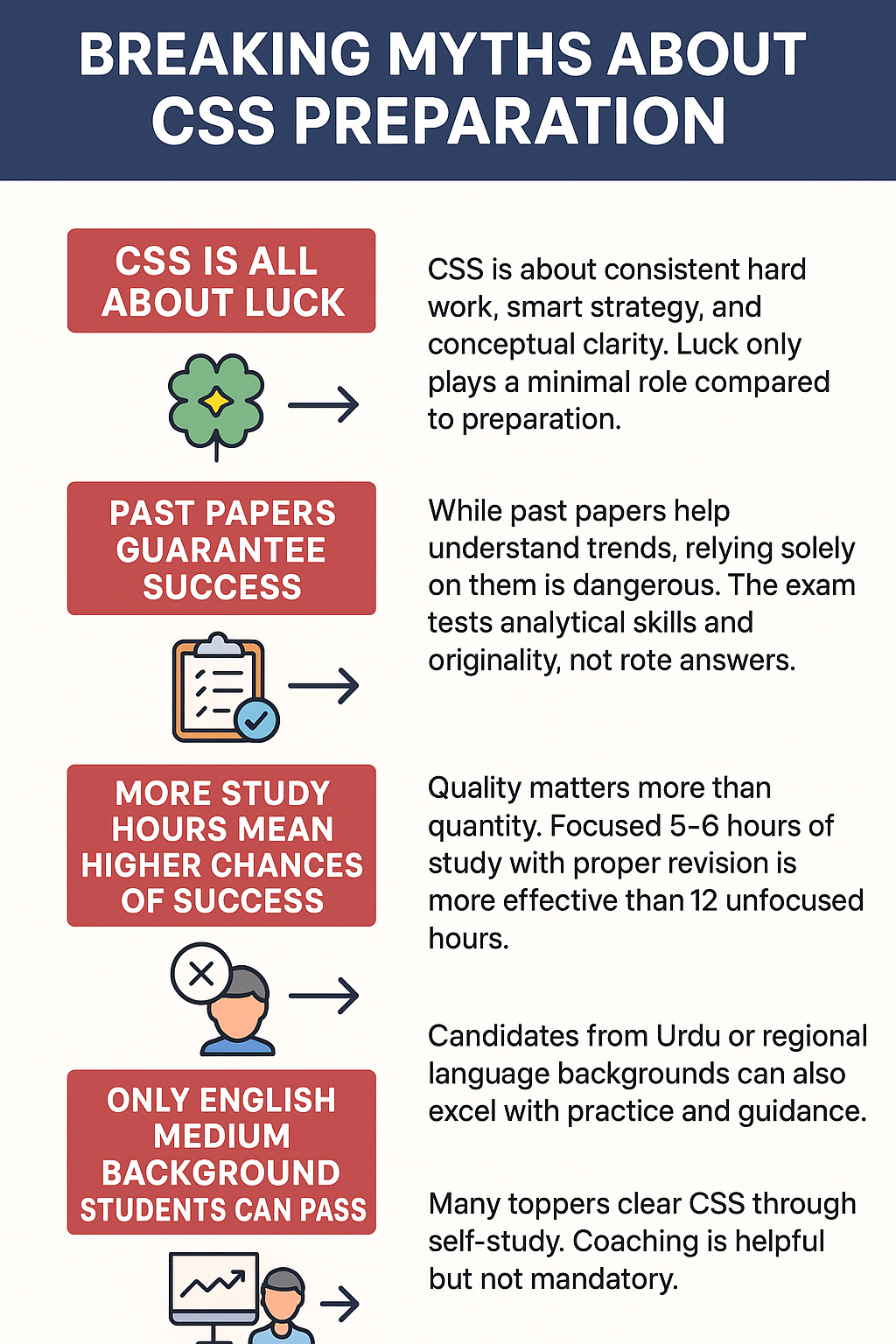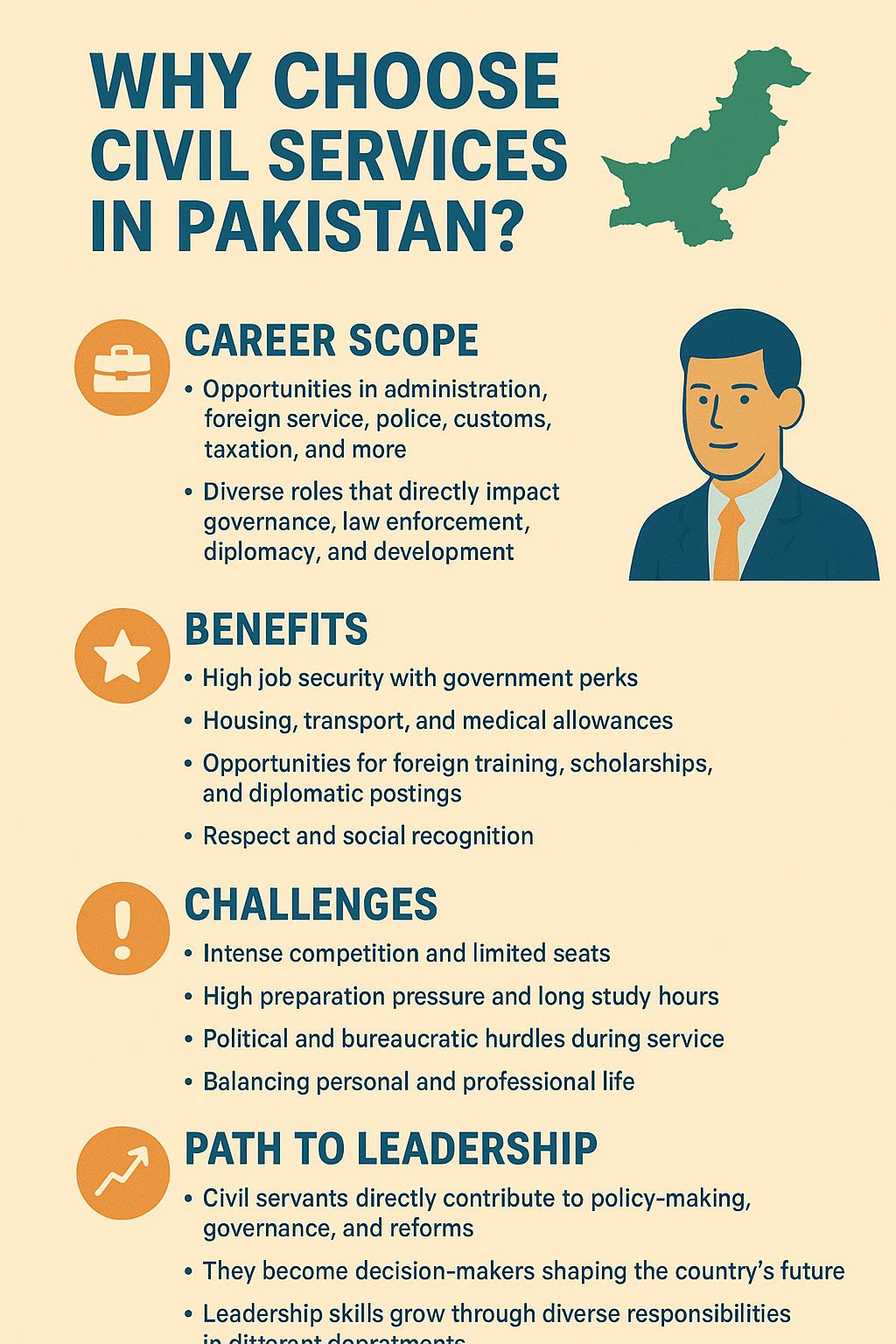The Central Superior Services (CSS) and Provincial Management Services (PMS) exams in Pakistan are gateways to prestigious careers in civil services, offering opportunities to serve the nation and shape its future. These exams, conducted by the Federal Public Service Commission (FPSC) for CSS and provincial commissions for PMS, are highly competitive, with pass rates often below 3%. Preparing from scratch for the 2026, 2027, or 2028 exams requires strategy, discipline, and a clear roadmap. Whether you’re a fresh graduate or a working professional, this comprehensive guide will walk you through every step to ace the CSS and PMS exams.
Understanding the CSS and PMS Exams
What is CSS?
The CSS exam selects candidates for Pakistan’s federal bureaucracy, placing them in 12 occupational groups like the Pakistan Administrative Service (PAS), Police Service of Pakistan (PSP), and Foreign Service of Pakistan (FSP). It’s held annually, typically in February, and tests candidates through written exams, interviews, and medical/psychological assessments.
What is PMS?
The PMS exam, conducted by provincial commissions (e.g., PPSC for Punjab, SPSC for Sindh), recruits for provincial government roles. It’s similar to CSS but focuses on provincial administration and has slight variations in syllabus and structure.
Key Differences
- Scope: CSS is federal; PMS is provincial.
- Syllabus: CSS has 12 compulsory and optional subjects (1200 marks); PMS varies by province but typically includes 6-9 subjects.
- Difficulty: CSS is generally more competitive due to its national scope and prestige.
- Eligibility: Both require a bachelor’s degree; CSS age limit is 21-30 (32 for some categories), while PMS may extend to 35 in some provinces.
Quote to Inspire: As Quaid-e-Azam Muhammad Ali Jinnah said, “With faith, discipline, and selfless devotion to duty, there is nothing worthwhile that you cannot achieve.” Let this guide be your disciplined path to success.
Step-by-Step Roadmap for CSS and PMS Preparation
Preparation is not about age, but about commitment. Ideal preparation time is 12–18 months, starting with mental discipline and motivation. As Napoleon Hill says:
“Whatever the mind can conceive and believe, it can achieve.”
You don’t need to study 14 hours a day—you need to study smart, consistently, and with purpose.
Step 1: Assess Your Eligibility and Commitment (1 Month)
Before diving in, confirm you meet the eligibility criteria:
- Age: 21-30 for CSS (as of December 31 of the exam year); check PMS age limits per province.
- Education: Minimum bachelor’s degree (2nd division for CSS; check provincial requirements for PMS).
- Commitment: CSS/PMS prep requires 6-12 months of focused effort (4-6 hours daily for beginners).
Action Plan:
- Research the CSS syllabus on the FPSC website (fpsc.gov.pk) and PMS syllabi on respective provincial websites (e.g., ppsc.gop.pk).
- Understand the exam structure: CSS includes 6 compulsory subjects (600 marks) and 6 optional subjects (600 marks). PMS typically has 3-6 compulsory and 3-6 optional subjects.
- Evaluate your strengths (e.g., writing, analytical skills) and weaknesses (e.g., current affairs knowledge).
Real Example: Adeel Niaz, a 2018 CSS topper, started as a schoolteacher in a small village. He spent a month understanding the syllabus and committed to 8 hours of daily study, proving that dedication can overcome any starting point.
Step 2: Build a Strong Foundation (2-3 Months)
For beginners, building a knowledge base is crucial. Focus on compulsory subjects and general awareness.Start by downloading the latest FPSC and provincial syllabi. Then:
- Identify scoring trends of optional subjects.
- Choose optional subjects based on your background, interest, and scoring potential.
- Consult past papers and successful candidates’ DMCs (marks sheets).
Subjects like Criminology, Sociology, Gender Studies, and IR have gained popularity, but suitability varies per person.
Work on compulsory subjects first
Compulsory Subjects (CSS)
- English Essay (100 marks): Tests your ability to write coherent, well-structured essays. Most students fail in these. Practice writing daily and get your work checked. Read English Grammar in Use by Raymond Murphy and practice precis writing using past papers. Aim to write one essay weekly on topics like climate change or governance.
- English Precis & Composition (100 marks): Focuses on grammar, vocabulary, and precis writing.
- General Science & Ability (100 marks): Covers basic science, math, and analytical reasoning. Use General Science by Mian Shafiq and practice quantitative reasoning from GRE prep books. Focus on MCQs, basic science, and mathematical logic.
- Current Affairs (100 marks): Tests knowledge of national and international issues.Use newspapers (Dawn, The News) and authentic books like Ikram Rabbani’s. Follow international outlets like The Economist or Al Jazeera.
- Pakistan Affairs (100 marks): Focuses on Pakistan’s history, politics, and geography. Study Pakistan: A Modern History by Ian Talbot and The Struggle for Pakistan by Ayesha Jalal.
- Islamic Studies (100 marks): Covers Islamic history and principles (non-Muslims can opt for Comparative Religion). Read authentic books and build your reference for your arguments..
Step 3: Choose Optional Subjects Wisely (1 Month)
Optional subjects are critical, as they contribute 600 marks in CSS and a significant portion in PMS. Choose subjects based on:
- Interest: Pick subjects you enjoy to stay motivated.
- Scoring Potential: Subjects like International Relations, Sociology, and Public Administration are high-scoring.
- Overlap: Select subjects that overlap with compulsory ones (e.g., History with Pakistan Affairs).
Recommended CSS Optional Subjects: Sample
- Group 1: International Relations, Political Science.
- Group 2: If necessary, select as per your degree
- Group 3: Public Administration, Governance & Public Policies.
- Group 4: European History, US History.
- Group 5: Environmental Science, Gender studies
- Group 6: Philosophy, Criminology, Constitutional Law
- Group 7: Regional Languages ( Punjabi etc),
Action Plan:
- Download the CSS syllabus and past papers from fpsc.gov.pk.
- Analyze past papers to identify high-scoring topics.
- Consult toppers’ blogs or platforms like Nearpeer.org for subject insights.
- Finalize 600 marks’ worth of optional subjects (e.g., 3 subjects of 200 marks each).
Step 4: Create a Study Schedule (Ongoing)
A structured schedule is your backbone. Allocate time based on your weaknesses and exam timeline (2026, 2027, or 2028). Design a study timetable that includes:
- Reading hours
- Writing practice sessions
- Revision blocks
- Current affairs updates
- Monthly test days
Sample 6-Hour Daily Schedule
- 8 AM – 10 AM: English Essay/Precis practice.
- 10 AM – 12 PM: Current Affairs + Pakistan Affairs (reading Dawn and notes).
- 1 PM – 3 PM: Optional Subject 1 (e.g., International Relations).
- 3 PM – 5 PM: Optional Subject 2 or General Science & Ability.
- Evening: Revise notes, solve past papers, or watch CSS prep videos on YouTube (e.g., CSS Hub).
Action Plan:
- Study 4-6 hours daily (increase to 8-10 hours closer to the exam).
- Dedicate weekends to mock tests and essay writing.
- Use apps like Notion or Trello to track progress.
8. Mental and Physical Fitness – The Secret Ingredient
Civil service is demanding. Your mental fitness matters:
- Sleep 7–8 hours a night
- Do light exercise, walk, or yoga
- Keep a journal or motivational diary
As Quaid-e-Azam once said:
“With faith, discipline, and selfless devotion to duty, there is nothing worthwhile that you cannot achieve.”
Step 5: Master Answer Writing and Time Management (3-4 Months)
The CSS/PMS exams test your ability to articulate ideas clearly and concisely. Answer writing is an art that requires practice.
Tips for Answer Writing
- Structure: Use an introduction, body (with headings), and conclusion.
- Clarity: Write legibly, avoid jargon, and use facts/figures (e.g., “Pakistan’s literacy rate is 60% as per UNESCO 2023”).
- Practice: Solve 5 past papers per subject, focusing on time management (20 minutes per question in CSS).
Action Plan:
After 4–5 months of study:
- Join mock exams or online academies
- Write 1–2 essays and precis per week
- Attempt timed past papers: CSS allows ~2.5 hours per 100-mark paper.
Get feedback from mentors or join platforms like CogitaVerse CSS Review Group.
Step 6: Prepare for Interviews and Psychological Tests (2 Months)
After clearing the written exam, CSS candidates face a psychological assessment and interview (300 marks). PMS also includes interviews in most provinces.
Psychological Assessment
- Tests personality, leadership, and stress handling.
- Practice group discussions and situational questions (e.g., “How would you handle a corrupt subordinate?”).
Interview
- Focuses on your knowledge, confidence, and personality.
- Prepare topics like Pakistan’s foreign policy, economy, and your optional subjects.
- Dress professionally and practice mock interviews.
Action Plan:
- Read How to Prepare for CSS Interviews by Adeel Niaz.
- Join mock interview sessions at academies or online platforms.
- Stay updated on current affairs until the interview date.
Global Inspiration: As Kofi Annan said, “Knowledge is power. Information is liberating.” Stay informed and confident to ace the interview.
Step 7: Utilize Resources and Stay Motivated
Recommended Resources
- Books: Pakistan Affairs by Ikram Rabbani, International Relations by Joshua Goldstein.
- Online Platforms: Nearpeer.org, CSSForum.com.pk, YouTube channels (e.g., CSS Prep by Sir Sabir).
- Newspapers: Dawn, The News for current affairs.
- Apps: Evernote for note-taking, Quizlet for flashcards.
Staying Motivated
- Join CSS/PMS study groups on WhatsApp or Telegram.
- Follow toppers’ interviews on YouTube for inspiration.
- Take breaks to avoid burnout; exercise or meditate daily.
Real Example: Dr. Sania Nishtar, a former CSS officer, balanced her prep with medical studies by staying disciplined and motivated, showing that multitasking is possible with focus.
Step 8: Final Prep and Exam Day Tips (1-2 Months Before Exam)
- Revise notes thoroughly; avoid new topics.
- Solve 10-15 past papers per subject under timed conditions.
- Prepare a concise revision notebook for quick reference.
- Exam Day: Carry required documents (CNIC, roll number slip), arrive early, and stay calm.
Quote to Inspire: As Imran Khan said, “Never give up on your dreams, no matter how big they are.” Your CSS/PMS dream is within reach with persistence.
9. Benefits of Starting Early with CogitaVerse – The Smart Way Forward
At CogitaVerse, we’re building a complete support ecosystem for CSS, PMS, and other exams:
- Smart blog articles & detailed notes
- Optional & compulsory subject breakdowns
- Urdu + English content for wide accessibility
- YouTube video series with real-time guidance
- Motivational content & success strategies
Let’s simplify the complexity of CSS together.
Additional Tips for 2026, 2027, 2028
- 2027 Aspirants: Start now to allow 12-18 months of prep. Focus on building a strong foundation.
- 2028/2029 Aspirants: Use the extra time to deepen your knowledge and practice extensively.
- Stay Updated: FPSC occasionally revises the syllabus; check fpsc.gov.pk annually.
- PMS-Specific: Research provincial syllabi (e.g., PPSC updates syllabus every 2-3 years).
Conclusion: Your Journey to Civil Services
Preparing for CSS and PMS from scratch is a marathon, not a sprint. With a structured plan, disciplined effort, and the right resources, you can join the ranks of Pakistan’s top civil servants like Hina Rabbani Khar or Rizwan Ahmed, who transformed challenges into opportunities. Start today, stay consistent, and let your hard work shape Pakistan’s future. As Nelson Mandela said, “It always seems impossible until it’s done.” Make it happen!
Thousands apply; only a few succeed. But the real journey begins with belief. Whether you become a PAS officer, a diplomat, or a provincial policy reformer—you’ll become a changemaker.
“Don’t limit your challenges. Challenge your limits.” – Anonymous
With the right guidance, consistent effort, and a bit of faith—you can turn your CSS/PMS dream into a powerful career.
Proudly Powered By



